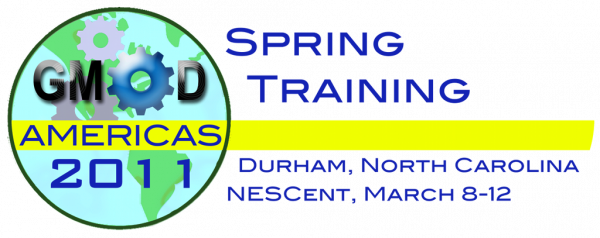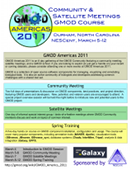GMOD
2011 GMOD Spring Training


Contents
- 1 Course Sessions → Online Tutorials
- 2 Schedule
- 3 Instructors
- 4 Prerequisites
- 5 System Requirements
- 6 Applications
- 7 Costs
- 8 Sponsors
- 9 Get the Word Out!
- 10 Travel, Lodging and Meals
- 11 Feedback
The 2011 GMOD Spring Training was held March 8-12 at the National Evolutionary Synthesis Center (NESCent) in Durham, North Carolina, as part of GMOD Americas 2011. Like previous GMOD Schools, this one focused on installing, configuring and integrating popular GMOD Components. Sessions were taught by GMOD Component developers and GMOD staff. There was space for 25 participants and admission was competitive.
Course Sessions → Online Tutorials
The course sessions will become online tutorials on this wiki following the course.
These tutorials will be updated: |
And these tutorials will be added:
|
Schedule
| Time | Event |
|---|---|
| March 4 | |
| 7pm-9pm | Introduction to GMOD |
| March 5-6 | |
| 9am-5pm | March 2011 GMOD Community Meeting |
| March 7 | |
| 8:30am-5pm | Satellite Meetings |
| Tuesday March 8 through Saturday March 12 | |
| 8:30am-6:00pm 7:30pm-9pm |
2011
GMOD Spring Training
A week long hands-on course on GMOD Component installation,
configuration, and usage. The course will cover these components in
detail:
Apollo • MAKER • GBrowse • Chado • InterMine • JBrowse • GBrowse_syn • Tripal • GFF3 • Galaxy • SOBA |
Most sessions lasted half a day. We tried something new this year: Each night the instructors for that day’s topics were available to answer questions and help participants use the tools with their data.
Instructors
Sessions were taught by experienced component developers and GMOD project staff:
| Instructor | GMOD Affiliation | Affiliation |
|---|---|---|
| Scott Cain | GMOD Project Coordinator; Chado, GBrowse | <a href=”http://www.oicr.on.ca/” class=”external text” |
| rel=”nofollow”>Ontario Institute for Cancer Research</a> | ||
| Dave Clements | GMOD Help Desk | <a href=”http://nescent.org/” class=”external text” |
| rel=”nofollow”>National Evolutionary Synthesis Center (NESCent)</a> | ||
| Stephen Ficklin | Tripal | <a href=”http://www.wsu.edu” class=”external text” |
| rel=”nofollow”>Washington State University</a> | ||
| Alex Kalderimis | InterMine | <a href=”http://flymine.org” class=”external text” |
| rel=”nofollow”>FlyMine</a> | ||
| Barry Moore | MAKER | <a href=”http://www.utah.edu” class=”external text” |
| rel=”nofollow”>University of Utah</a> | ||
| Ed Lee | Apollo | <a href=”http://www.berkeleybop.org/” class=”external text” |
| rel=”nofollow”>Berkeley Bioinformatics Open-source Projects (BBOP)</a> | ||
| Sheldon McKay | GBrowse_syn, GBrowse | <a href=”http://iplantcollaborarive” class=”external text” |
| rel=”nofollow”>iPlant Collaborative</a> | ||
| Mitch Skinner | JBrowse | <a href=”http://berkeley.edu” class=”external text” |
| rel=”nofollow”>University of California, Berkeley</a> |
Prerequisites
The course requires a minimal level of Linux systems administration knowledge (see Computing Requirements). By “a minimal level of Linux systems administration knowledge” we mean that participants should be
- Comfortable with the Linux command line interface, and
- Comfortable installing packages under Linux.
A good benchmark for this level of knowledge is that you should be able to get a basic GBrowse installation (that is, GBrowse without MySQL) up and running with the example GBrowse data. This also requires installing Apache, and BioPerl and all its dependencies.
System Requirements
Participants are required to bring their own laptops, already capable of running a virtual system (e.g. VMware) image.
The course starts with getting a virtual system image (built specifically for the course) up and running on your machine. We then build upon that image in each succeeding session. We will probably use VMware for the course:
VMware on Windows and Linux
| | | |
|—-|—-|—-|
| ![]() |
| ![]() | A free VMware player is available for Microsoft Windows and Linux operating systems from VMware. You will need to register to download it. There are multiple versions. Be sure to download a version that can run on your laptop. |
| A free VMware player is available for Microsoft Windows and Linux operating systems from VMware. You will need to register to download it. There are multiple versions. Be sure to download a version that can run on your laptop. |
VMware on Mac OS X
| | |
|—-|—-|
| ![]() | Participants can also bring newer Macs with Intel processors. The Intel processor is a requirement for all the packages discussed below. There is no free VMware player that runs directly under Mac OS X. However, there are several other options, all of which require an Intel Mac: |
| Participants can also bring newer Macs with Intel processors. The Intel processor is a requirement for all the packages discussed below. There is no free VMware player that runs directly under Mac OS X. However, there are several other options, all of which require an Intel Mac: |
VMware Fusion
| | |
|—-|—-|
| ![]() | VMware Fusion ($80/corporate, $40/Academic) allows you to run VMware images (as well as Windows and Linux) under Mac OS. We recommend this option for Mac users. There is a fully functional, 30 day free trial version of VMware Fusion available for download. |
| VMware Fusion ($80/corporate, $40/Academic) allows you to run VMware images (as well as Windows and Linux) under Mac OS. We recommend this option for Mac users. There is a fully functional, 30 day free trial version of VMware Fusion available for download. |
VirtualBox
| | |
|—-|—-|
| ![]() | VirtualBox is free and open source, and runs on Intel Macs (and Windows, Linux and Solaris too). It claims to be capable of running VMware images, but we have not tested this with our images. |
| VirtualBox is free and open source, and runs on Intel Macs (and Windows, Linux and Solaris too). It claims to be capable of running VMware images, but we have not tested this with our images. |
Applications
The application deadline was January 7, 2011. However, late applications were accepted until March 1, and were automatically placed on the waiting list, and considered as cancellations occured. Applicants were notified of admission status by January 21.
Admission to the course was competitive and was based on the strength of the application (especially the statement of interest). In 2010 there were over 60 applicants for 25 slots.
Costs
The tuition is $265 for the course (less than $55 per day) to pay instructor costs and incidentals.
Sponsors
The National Evolutionary Synthesis Center (NESCent) is hosting this course and all other GMOD Americas 2011 events. NESCent is interested in outreach to groups who are underrepresented in evolutionary biology and improving evolution education, and offers resources for scientists, educators, and the general public that meet these goals.
![]()
The Galaxy Project is also sponsoring this course and all other GMOD Americas 2011 events. Galaxy is a analysis and data integration framework that enables biologists to both analyze their data, and to archive those analyses (including data sets and program parameters) for future reference. Galaxy is developed at Penn State and Emory University.
Finally, course tuition would be much, much higher without the financial support of the instructor’s projects and institutions. Please thank them and their projects profusely for sponsoring their participation in this event.
Get the Word Out!
Help spread the word about GMOD Spring Training and other GMOD Americas 2011 events by posting and distributing this flier, or the event announcements to your communities, mailing lists, and organizations.
There are many organizations out there that are struggling to cope with the volume of data that have and will continue to get in the future. GMOD is an excellent option for helping these groups get a grip on and exploit their data.
Travel, Lodging and Meals
See the GMOD Americas 2011 page for details.
Feedback
| Would you recommend GMOD Summer School to others? | Please rate the quality of the course overall. | |||||||||||||||||||||||||||||||
|
|
|||||||||||||||||||||||||||||||
The “Yes, with reservations” responses were:
- This workshop is meant more for bioinformaticians than for biologists. That would be my ‘reservation’.
- This is an amazing course. I learned more than I expected and all the instructors were great.
- I was actually surprised at how many of the researchers in the room were comfortable with the somewhat involved installations. You definitely have to be comfortable not just with command line, but with a lot of Unix concepts… This course would not be for someone shackled to Mac or Win and clicky interfaces, I don’t think… Conversely, an IT person with no biology background might also get a bit overwhelmed…
- I feel some sessions need more time.

